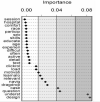Satisfaction with web-based training in an integrated healthcare delivery network: do age, education, computer skills and attitudes matter?
- PMID: 18922178
- PMCID: PMC2575204
- DOI: 10.1186/1472-6920-8-48
Satisfaction with web-based training in an integrated healthcare delivery network: do age, education, computer skills and attitudes matter?
Abstract
Background: Healthcare institutions spend enormous time and effort to train their workforce. Web-based training can potentially streamline this process. However the deployment of web-based training in a large-scale setting with a diverse healthcare workforce has not been evaluated. The aim of this study was to evaluate the satisfaction of healthcare professionals with web-based training and to determine the predictors of such satisfaction including age, education status and computer proficiency.
Methods: Observational, cross-sectional survey of healthcare professionals from six hospital systems in an integrated delivery network. We measured overall satisfaction to web-based training and response to survey items measuring Website Usability, Course Usefulness, Instructional Design Effectiveness, Computer Proficiency and Self-learning Attitude.
Results: A total of 17,891 healthcare professionals completed the web-based training on HIPAA Privacy Rule; and of these, 13,537 completed the survey (response rate 75.6%). Overall course satisfaction was good (median, 4; scale, 1 to 5) with more than 75% of the respondents satisfied with the training (rating 4 or 5) and 65% preferring web-based training over traditional instructor-led training (rating 4 or 5). Multivariable ordinal regression revealed 3 key predictors of satisfaction with web-based training: Instructional Design Effectiveness, Website Usability and Course Usefulness. Demographic predictors such as gender, age and education did not have an effect on satisfaction.
Conclusion: The study shows that web-based training when tailored to learners' background, is perceived as a satisfactory mode of learning by an interdisciplinary group of healthcare professionals, irrespective of age, education level or prior computer experience. Future studies should aim to measure the long-term outcomes of web-based training.
Figures



Similar articles
-
Computer-aided vs. tutor-delivered teaching of exposure therapy for phobia/panic: randomized controlled trial with pre-registration nursing students.Int J Nurs Stud. 2007 Mar;44(3):397-405. doi: 10.1016/j.ijnurstu.2006.02.009. Epub 2006 Apr 24. Int J Nurs Stud. 2007. PMID: 16631177 Clinical Trial.
-
Development, implementation and pilot evaluation of a Web-based Virtual Patient Case Simulation environment--Web-SP.BMC Med Educ. 2006 Feb 21;6:10. doi: 10.1186/1472-6920-6-10. BMC Med Educ. 2006. PMID: 16504041 Free PMC article.
-
Measurement of information and communication technology experience and attitudes to e-learning of students in the healthcare professions: integrative review.J Adv Nurs. 2009 Apr;65(4):755-72. doi: 10.1111/j.1365-2648.2008.04924.x. Epub 2009 Feb 9. J Adv Nurs. 2009. PMID: 19228242 Review.
-
Simulating extracorporeal membrane oxygenation emergencies to improve human performance. Part I: methodologic and technologic innovations.Simul Healthc. 2006 Winter;1(4):220-7. doi: 10.1097/01.SIH.0000243550.24391.ce. Simul Healthc. 2006. PMID: 19088593
-
Web-based framework for improving geriatric education.Gerontol Geriatr Educ. 2004;25(2):43-55. doi: 10.1300/J021v25n02_04. Gerontol Geriatr Educ. 2004. PMID: 15778145 Review.
Cited by
-
Towards a HR Framework for Developing a Health-Promoting Performance Culture at Work: A Norwegian Health Care Management Case Study.Int J Environ Res Public Health. 2020 Dec 8;17(24):9164. doi: 10.3390/ijerph17249164. Int J Environ Res Public Health. 2020. PMID: 33302463 Free PMC article.
-
Experiences and perceptions of online continuing professional development among clinicians in sub-Saharan Africa.Hum Resour Health. 2017 Dec 29;15(1):89. doi: 10.1186/s12960-017-0266-4. Hum Resour Health. 2017. PMID: 29284492 Free PMC article.
-
Learner feedback and educational outcomes with an internet-based ambulatory curriculum: a qualitative and quantitative analysis.BMC Med Educ. 2012 Jul 12;12:55. doi: 10.1186/1472-6920-12-55. BMC Med Educ. 2012. PMID: 22788677 Free PMC article.
-
Implementing a multi-professional web-based learning environment for a comprehensive cancer centre: obstacles, solutions and reflections.J Cancer Educ. 2012 Mar;27(1):37-41. doi: 10.1007/s13187-011-0261-8. J Cancer Educ. 2012. PMID: 21866413
-
Challenges of applying continuing education in tehran hospital practice as viewed by nurses.Int J Community Based Nurs Midwifery. 2015 Apr;3(2):123-31. Int J Community Based Nurs Midwifery. 2015. PMID: 26005692 Free PMC article.
References
-
- Morrissey J. Internet dominates providers' line of sight. Mod Healthc. 2000;30:72–82. - PubMed
-
- Nelson EA. E-learning. A practical solution for training and tracking in patient-care settings. Nurs Adm Q. 2003;27:29–32. - PubMed
-
- Howatson-Jones L. Designing web-based education courses for nurses. Nurs Stand. 2004;19:41–4. - PubMed
Publication types
MeSH terms
LinkOut - more resources
Full Text Sources

